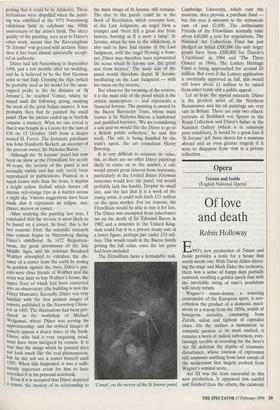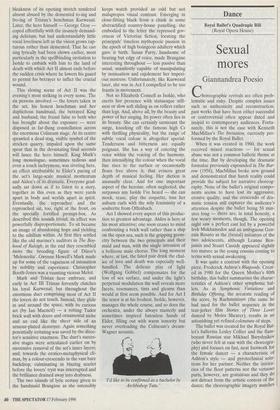Opera
Tristan and Isolde (English National Opera)
Of love and death
Robin Holloway
ENO's new production of Tristan and Isolde provides a tonic for a house that surely needs one. With David Alden direct- ing the stage and Mark Elder the orchestra, there was a sense of happy days partially restored, recalling a golden epoch that with the inevitable swing of time's pendulum will surely return.
Wagner's music-drama, a towering centrepoint of the European spirit, is nev- ertheless the product of a domestic mael- strom in a teacup from the 1850s, zenith of bourgeois morality, emanating from Zurich, safest and tightest of capitalist cities. On the surface a monument to romantic passion at its most exalted, it remains a work of radical subversion, ever- lastingly terrible in sounding for the hero's Act III delirium the depths of traumatic disturbance, whose rawness of expression still surpasses anything from later annals of the modernism that largely evolved from Wagner's seminal score.
Act III was the least successful in this new production. It appeared less careful and finished than the others, the catatonic bleakness of its opening stretch rendered almost absurd by the demented to-ing and fro-ing of Tristan's henchman Kurwenal. Later, the hero himself — George Gray — coped effortfully with the insanely demand- ing delirium, but had understandably little vocal loveliness left as the vision grows rap- turous rather than demented. That he can sing lyrically had been shown earlier, most particularly in the spellbinding invitation to Isolde to embark with him to the land of death with which Act II almost ends before the sudden crisis where he lowers his guard to permit his betrayer to inflict the crucial wound.
This closing scene of Act II was the evening's most striking in every sense. The six persons involved — the lovers taken in the act, his honest henchman and her duplicitous handmaid, the betrayed King and husband, the friend false to both who has brought about the exposure — were disposed in far-flung constellation across the enormous Coliseum stage. At its centre sprawled a dead stag, visible symbol of the stricken quarry, impaled upon the same spear that in the devastating final seconds will lance the hero himself. King Mark's long monologue, sometimes tedious and even a touch lachrymose, was riveting here, an effect attributable to Elder's pacing of the act's large-scale musical morrientum and Alden's of its dramatic. Everyone grad- ually sat down as if to listen to a story, together in this even as they were yards apart in body and worlds apart in spirit. Eventually, the reproacher and the reproached sat, too, right at the front, on the specially fortified prompt-box. As described this sounds trivial; its effect was powerfully disproportionate. To sit became an image of abandoning hope and yielding to the nihilism within. At first they settled like the old mariner's auditors in The Boy- hood of Raleigh; in the end they resembled more the brooding figure of Diirer's `Melencolia'. Gwynne Howell's Mark made up for some of the vagueness of intonation by nobility and experience. Christopher Booth-Jones was a vaunting vicious Melot.
Mark and Tristan here embrace, and early in Act III Tristan fervently clutches his loyal Kurwenal; but throughout the enormous duet comprising most of Act II the lovers do not touch. Instead, they glide in and around the space, with its curious set (by Ian Macneil) — a rotting Tudor brick wall with doors and ornamental niche and an end like the sheer side of an armour-plated destroyer. Again something potentially irritating was saved by the direc- tor's sensitive exactness. The duet's succes- sive stages were articulated earlier on by successive removal of the set's inner layers; and, towards the erotico-metaphysical cli- max, by a colour-crescendo in the vast bare backdrop, culminating in blazing scarlet before the lovers' tryst was interrupted and the brilliance drained away into drabness.
The two islands of lyric ecstasy given to the handmaid Brangane as she ostensibly keeps watch provided an odd but not malapropos visual contrast. Emerging in close-fitting black from a chink in some abstractified country-house panelling, she embodied to the letter the repressed gov- erness of Victorian fiction, locuting the principals' timeless mythopoeic passion in the epoch of high bourgeois adultery which gave it birth. Susan Parry, handsome of bearing but edgy of voice, made Brangane interesting throughout — less passive than usual, manifestly capable of manipulating by insinuation and cajolement her imperi- ous mistress. Unfortunately, like Kurwenal later, she was in Act I compelled to be too frantic in movement.
Not so Elizabeth Connell as Isolde, who exerts her presence with statuesque still- ness or slow soft sliding as on rollers rather than legs. And, above all, by the beauty and power of her singing. Its power often lies in its beauty. She can certainly surmount the surge, knocking off the famous high Cs with thrilling physicality, but the range of subtle vocal colour is altogether special. Tenderness and bitterness are equally poignant. She has a way of entering the voice within the voicing of the harmony, then intensifying the colour when the vocal line rises to the surface or occasionally floats free above it, that evinces great depth of musical feeling. Her diction is unusually clear. And for one important aspect of the heroine, often neglected, she surpasses any Isolde I've heard — she can mock, tease, play the coquette, toss her auburn curls with the wily femininity of a soubrette from Offenbach. .
Act I showed every aspect of this produc- tion to greatest advantage. Alden is here at his most attentive; one soon ceases to mind confronting a brick wall rather than a ship on the open sea, such is the gripping geom- etry between the two principals and their maid and man, with the single intrusion of a bellicose male chorus. The long moment where, at last, the fated pair drink the chal- ice of love and death was especially well- handled. The delicate play of light (Wolfgang GObbel) compensates for the loss of sea surface, and under the light's perpetual modulation the wall reveals more facets, resonances, tints and gleams than would at first seem possible. And for Act I the tenor is at his freshest. Isolde, however, manages the whole course, and so does the orchestra, under the always masterly and sometimes inspired batonless hands of Elder, filling out with warm sonority but never overloading the Coliseum's dream- Wagner acoustic.
'I'd like to be confirmed as a bachelor by Archbishop Tutu.'



























































 Previous page
Previous page